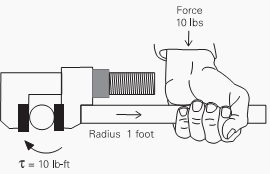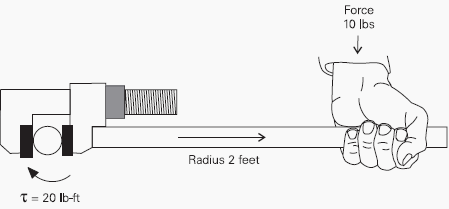Terms below are the basic mechanical terms associated with the mechanics of DC drive operation. Many of these terms are familiar to us in some other context.
- Force
- Net Force
- Torque
- Speed
- Linear Speed
- Angular (rotational) Speed
- Acceleration
- Law of Inertia
- Friction
- Work
- Power
- Horsepower
Force
In simple terms, a force is a push or a pull. Force may be caused by electromagnetism, gravity, or a combination of physical means. The English unit of measurement for force is pounds (lb).Net Force
Net force is the vector sum of all forces that act on an object, including friction and gravity. When forces are applied in the same direction they are added. For example, if two 10 lb forces were applied in the same direction the net force would be 20 lb.
If 10 lb of force were applied in one direction and 5 lb of force applied in the opposite direction, the net force would be 5 lb and the object would move in the direction of the greater force.

If 10 lb of force were applied equally in both directions, the net force would be zero and the object would not move.

Torque
Torque is a twisting or turning force that tends to cause an object to rotate. A force applied to the end of a lever, for example, causes a turning effect or torque at the pivot point.Torque (tau) is the product of force and radius (lever distance).
Torque (tau) = Force x Radius
In the English system torque is measured in pound-feet (lb-ft) or pound-inches (lb-in). If 10 lbs of force were applied to a lever 1 foot long, for example, there would be 10 lb-ft of torque.

An increase in force or radius would result in a corresponding increase in torque. Increasing the radius to 2 feet, for example, results in 20 lb-ft of torque.

Click here to read the full article
No comments:
Post a Comment